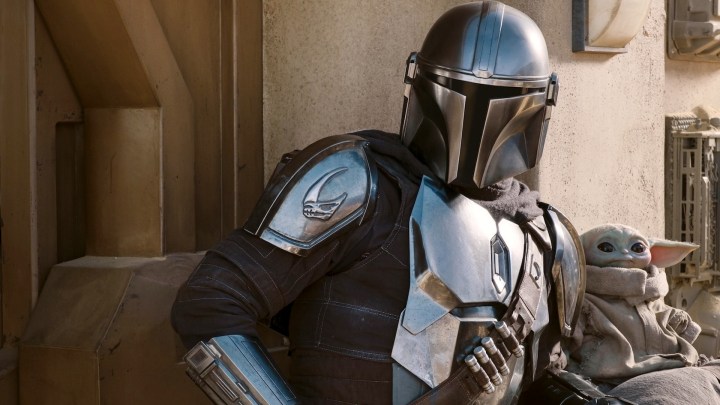George Lucas was interviewed by Roger Ebert and Gene Siskel for their 1990 television special, The Future of the Movies, and he identified his signature filmmaking trait as the speed with which the visuals moved.
Audiences in the 1970s were not used to such a quick style of shots and cuts. Not only because Star Wars is structured around swashbuckling exploits and breathless cliffhangers designed to race across the screen, but also because filmmakers throwing model spaceships and rubber puppets before the camera don't always want the audience to look too carefully. In the digital age, all we do is look, and this has ruined much of the magic.

Generation X has a nasty sense of ownership over the movie and TV properties that we grew up with. The biggest problem with Star Wars is that it is being made by and for people who are more interested in fan service than story. It's impossible to be objective about something you loved growing up. It's like giving a kid the keys to the toy store, which is exactly what has happened with Gen Xers being given the future of Star Wars.
The whole point of cinema was that it was ephemeral when you left the theater. Before home video came along, movies were meant to be experienced in the moment and dreamed about later, not have their every detail scrutinized. Movies were one-and-done broadcasts when they started playing on television in the 1950s. Fan communities began to organize at convention when cinema studies began. Everything is preserved forever in the age of the internet.
The disposable nature of Star Wars and Raiders of the Lost Ark was one of the reasons why Lucas modeled them after the Saturday afternoon serials he loved as a kid. You were not meant to scrutinize every detail. They were cheap to purchase admission to, and they provided cheap thrills. If something didn't hold together, you didn't care. It was about the motion on the screen. It was about being galvanized. You weren't going to complain about how the filmmakers didn't respect your patronage by interpreting some detail in a way that you didn't find acceptable. The movies were about having an experience.

They're more about fitting into an ever-expanding Canon, where every detail must be carefully filled in, every backstory elaborated, whether it has any inherent dramatic interest or not. The problem arises partly because Gen X understands Star Wars in a different way than we do, and that's because of nostalgia for the toys and merchandising of the films. This is the reason why The Book of Boba Fett and The Mandalorian are so familiar to kids.
playtime did not need to make sense. It did not need to have any internal logic. When cobbled together into a narrative, that approach is rarely successful. You need more than a closed loop of references to tell a story. This approach reveals its hollowness with the mess that is The Book of Boba Fett. Most Gen X Star Wars content is concerned with The Last Jedi. The animated content has proven to be more superior and more ambitious than the live-action content over the last 15 years. It is being absorbed into new live-action shows.
Since the ancient Greeks, reference and allusion have been part of the story. Classical Hollywood, the 1950s creature features and Westerns, as well as postwar Japanese films made their way to American shores, were all movies Lucas loved. The text of the film is just as famous for those influences as it is for the film itself. Lucas married the raw materials with his political opposition to the U.S. foreign policy to make art. Robert Rodriguez, who has directed three episodes of The Book of Boba Fett and one of The Mandalorian, is one of the directors who only make copies of existing material. The stories of The Rise of Skywalker, The Book of Boba Fett, and The Mandalorian show that the creators of the Star Wars franchise want to tell new stories.

When thinking about the Star Wars prequel trilogy, it's important to remember that Lucas was making very expensive independent films, but he had complete control over them. There was no interference from the studio. Compared to the TV shows and the sequels, the prequel trilogy look and feel different. All the complaints about them are true. You can see the ambition of the story worlds and the desire of Lucas to take risks with something new if you watch them without the dialogue. Any chance that risks will be taken has been eliminated by the corporatization of Star Wars. The problem is worse than that. Disney is squashing the artistic ambition of the filmmakers. Some filmmakers have been retained by the studio because they don't want to take risks with the original material.
As a proud Gen Xer, I'm overjoyed by the fact that my analog cohort has been able to gather virtually to celebrate our pop culture love across time and space. Kevin Smith dramatized that dream in his pre- internet Clerks when his characters theorize about the nature of Death Star politics. Our generation has become obsessed with all that joy. Rian Johnson with The Last Jedi and Dave Filoni on the animated shows are examples of how Gen X creators seem crippled by their love. Hopefully, Deborah Chow, a Gen Xer herself, will correct the ship with her work on the Obi-Wan Kenobi series. It may be time to hand Star Wars over to the younger generation if not. Maybe the new generations of filmmakers and storytellers should be encouraged to come up with something completely new, without a Star or a Wars anywhere to be found.